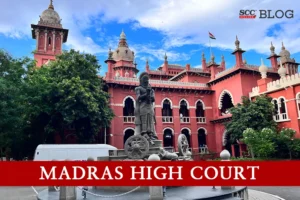Madras High Court: In a writ petition to declare the circular dated 12-09-2023 issued by the Principal of Thiru.Vi.Ka. Government Arts College at the instance of a sitting MLA of the ruling party in this State, as unconstitutional and affront to secularism being basic structure of constitution and consequently, forebear the respondents from conducting, organizing and program on the topic of anti-sanathanam, N. Seshasayee. J. said that Sanathana Dharama is a set of ‘eternal duties’ and if the topic chosen by the impugned circular is tested on these duties, it would mean that all these duties are liable to be destroyed.
In the impugned circular, the principal had required the girl-students studying in the college to share their views on the topic ‘Opposition to Sanathana’ on commemoration of the birthday of the former Chief Minister and founder of the DMK party, late C.N. Annadurai.
The Court said that it is conscious to open and noisy debates on pro and anti Sanathana Dharma. Further, it said that the Sanathana Dharma is a set of ‘eternal duties’, and that it cannot be traced to one specific literature, but has to be gathered from multiple sources which, either relate to Hinduism, or which those who practice the Hindu way of life, have come to accept. It includes the duty to the nation, duty to the King, King’s duty to his people, duty to one’s parents and Gurus, care for the poor, and whole lot of other duties.
The Court added that if the topic chosen by the impugned circular is now tested on the plane of these duties, it would then mean that all these duties are liable to be destroyed. It further questioned whether a citizen should not love his country or is he not under a duty to serve his nation and parents.
The Court remarked that an idea appears to have gained ground that Sanathana Dharma is all about promoting casteism and untouchability. Untouchability in a country of equal citizens, cannot be tolerated, and even if it is seen as permitted somewhere within the principles of ‘Sanathana dharma’, it still cannot have a space to stay, since Article 17 of the Constitution abolished untouchability. It is part of the fundamental right. Therefore, untouchability, either within or outside Sanatana Dharma can no longer be Constitutional, though sadly it still exits.
Discussing the fundamental right to free speech under Article 19(1)(a) of the Constitution, the Court said free speech cannot be hate speech, as the Supreme Court has cautioned. The users of free speech must not ignore these aspects while exercising their rights. If this is ignored, the course of any debate will get derailed, and the objective behind it will lose significance. Free speech must encourage healthy public debates, and help society to move forward, along the lines which the Constitution envisages.
The Court noted that the impugned circular was withdrawn, however, it still encouraged the College concerned to require the students to reflect on the evils of untouchability, and how as citizens of this country, they can contribute to its elimination.
[Elangovan v Secretary, 2023 SCC OnLine Mad 6176, Order dated 15-09-2023]
Advocates who appeared in this case :
For Petitioner: Senior Counsel G. Karthikeyan, Advocate D.Kamachi
For Respondents: Special Government Pleader C.Kathiravan

